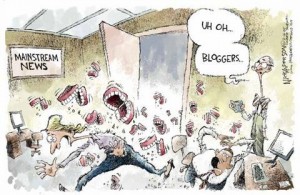 As the eyes of the world were focused on the shift-of-power resulting from America’s midterm elections, the FT published a piece (subscription required) on the shift-of-power resulting from the citizen journalism and social networking movements.
As the eyes of the world were focused on the shift-of-power resulting from America’s midterm elections, the FT published a piece (subscription required) on the shift-of-power resulting from the citizen journalism and social networking movements.
Sarah Murray opens her piece titled, “When Blogs Put Brands at Risk,” with a insidious-sounding quote from PR pioneer Edward Bernays: “The conscious and intelligent manipulation of the organised habits and opinions of the masses is an important element in democratic society.” Gee, don’t you hate when that word “manipulation” is used to describe the practice of public relations?
Anyway, Ms. Murray goes on to outline the challenges (and loss of control) faced by the modern PR practitioner in advancing a company’s message persona in the age of CGM, MySpace and YouTube. She writes:
“For companies worried about how consumers and activists view their business practices, these new media channels present a fresh challenge, undermining a traditional command-and-control approach to corporate communication and reputation management.”
“Public relations post-Gulliver” is how one blogger views the sea change on which Murray reports. My friend and colleague Rob Key of Converseon had this to say:
“It’s frightening for companies to think that their reputation is in the hands of third parties but, by definition, it is.”
Alice Marshall is less sanguine about the challenges posed to PR pros by the unwieldy and uncontrollable blogosphere:
“If you are running a profitable company you must have happy customers. Some of them are probably blogging about their positive experiences. A check of Technorati may reveal pleasant surprises. Firefox and GMail are two examples of products that benefited from blogger evangelism. PR shouldn’t be so afraid of the big bad blogosphere.”
“Yet while many companies have policies on how to engage with traditional media and even with blogs…” Murray writes, “…few have any in-house rules covering the kind of instant response required by bloggers and social networks.”
“There’s a level of vigilance that didn’t exist two or three years ago,” Converseon’s Key observed. “Companies are going to have to continue to be good corporate citizens because if they don’t, they’ll be called out on it very rapidly.”
Murray ends her piece with four pieces of advice for onine managers: “See What’s Out There,” “Respond Pro-Actively,” “Manage Online Conversations,” and “Match Rhetoric with Action.”
PR weblogs social media command-and-control public relations corporate reputation YouTube MySpace Financial Times Edward Bernays citizen journalism CGM